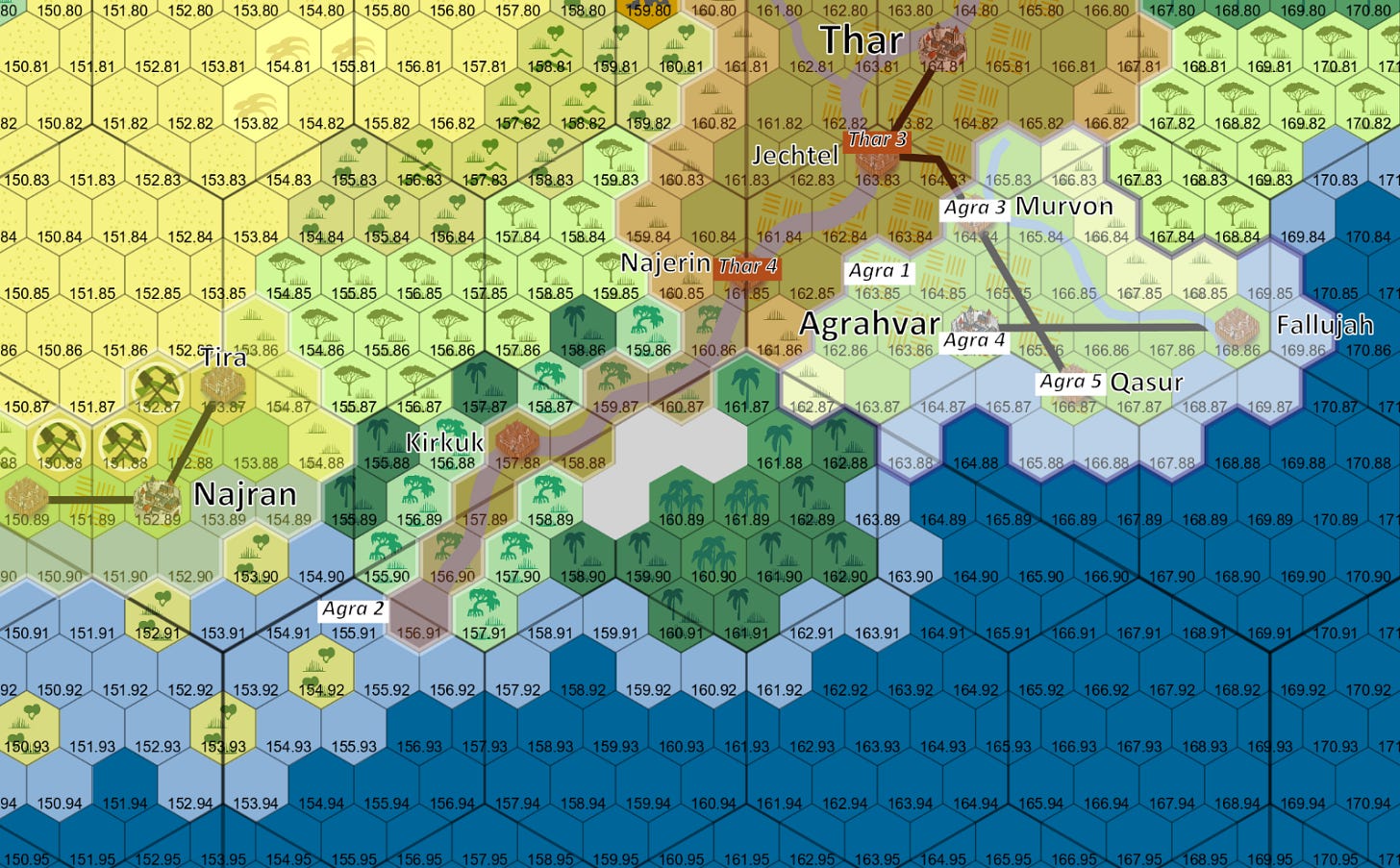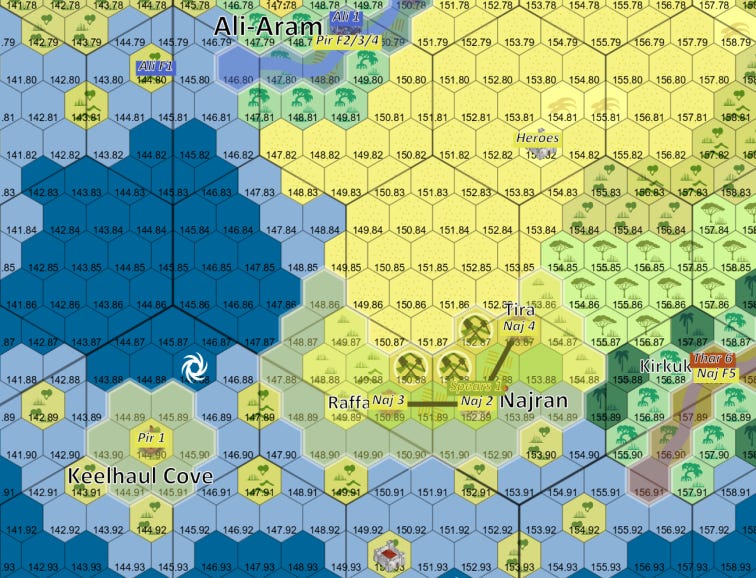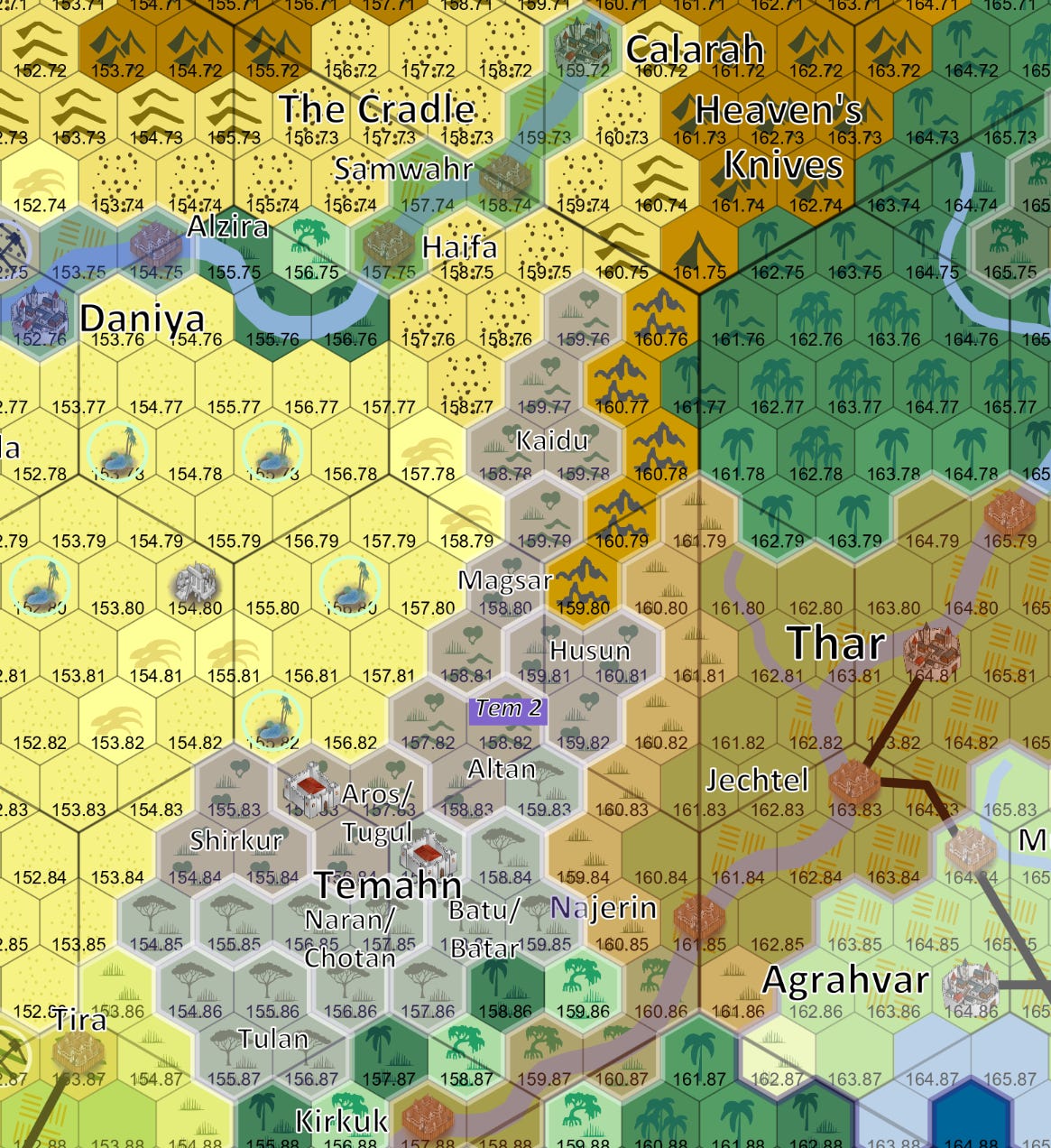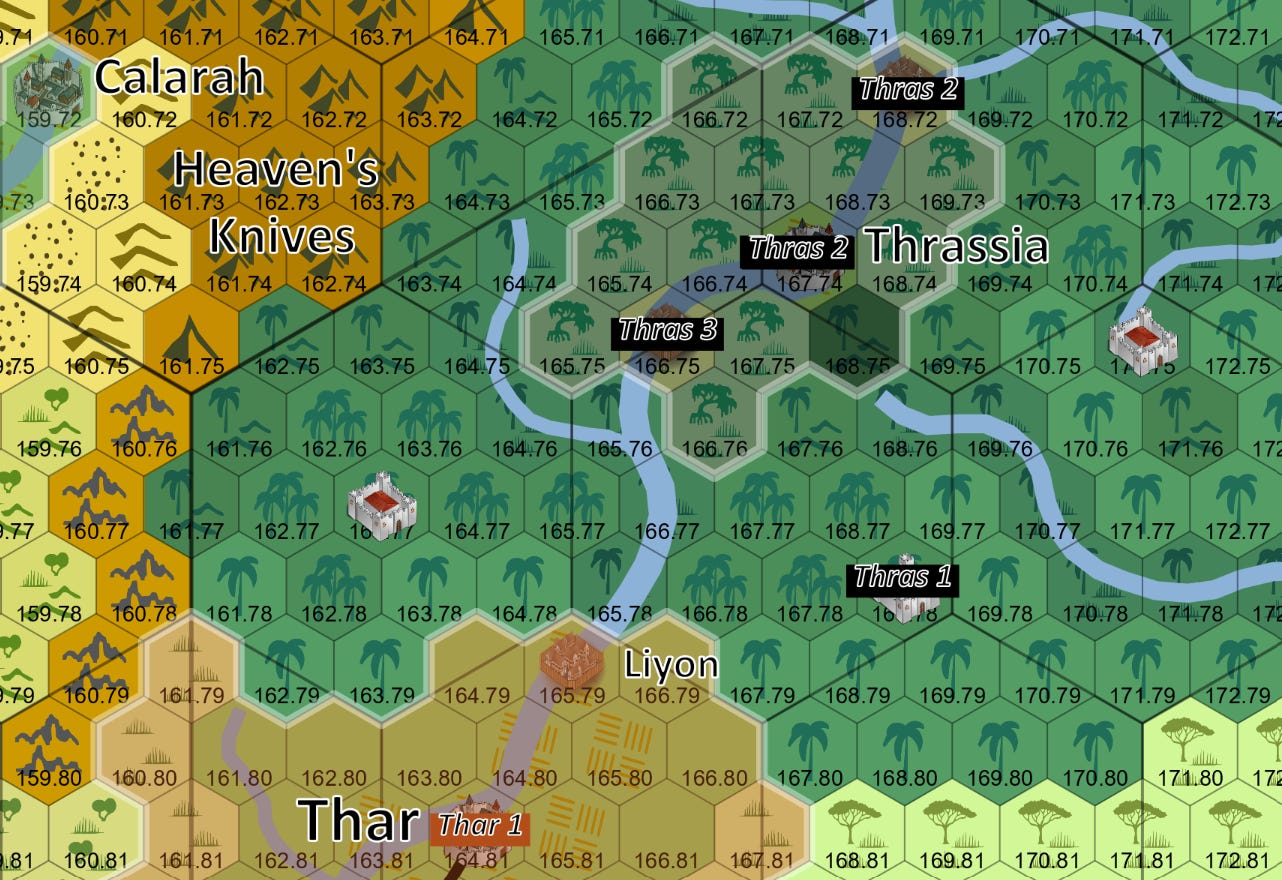The Fourth Week
The High Priestess joins the struggle!
I’ve fallen a bit behind on these updates — we’ve played through week six, so I’m working to get these writeups assembled. Expect a few in quick succession here, especially since this week is pretty straightforward.
Notable this fourth week, we had just acquired a player for the High Priestess of Ali-Aram, who dives right into the thick of things.
The Annals of War
Thar assembles a new host, augmenting its northern field army with forces from the garrisons of Thar and Jechtel, then sailing downriver to Kirkuk to attempt to ambush the Temahni army there — but they are too late, and find it long gone. They find the mercenary band the Spears of Heaven has assisted a pirate army and fleet in securing Kirkuk, so they open negotiations, and when that force pays proper obeisance and cedes the city to them, they immediately turn upon and obliterate it while it retreats (a few cavalry battalions from the Spears do make good their escape, but the entire fleet is defeated in detail).
Agrahvar has (finally) received some orders from Thar, the Caliph having at last decided it doesn’t hurt to give his treacherous vassals objectives that aim to keep them at a distance. Fleet Agra2 has rounded the southern jungles and is now on anti-piracy patrol, though they’re being lazy enough about it to be wholly ineffective.
The surviving members of the Spear of Heaven, who managed to escape Thar’s army in Kirkuk, ride west and carry word back to Najran. Ironically, due to the friction of war and uncoordinated communications, a reinforcing Najrani fleet arrives at Kirkuk soon after the destruction of the pirate one (Najran being at present secretly a client-state of the Pirate King), but is luckily able to play off their arrival as support sent to aid their liege against the pirates. The Caliph doesn’t particularly seem to buy it, but also doesn’t seem overly bothered with confronting this rather stronger fleet. Somerton himself is infiltrated into the Caliph’s army there, laying low as he lays plans for his next hijink.
The Sultan of Najran rides out from Tira with only a few men of his household and servants, to traverse the savannahs northward toward a dungeon rumored in the sands of the great desert. The Temahn permit him safe passage, and he reaches that site in time to meet up with the Pirate King’s witch-sister and her own attendants who fly in on called pegasi. Together they delve its depths with mixed results, finding it will take more time to plumb the deepest reaches, and their companions taking a number of nasty wounds in the process.
The Steward of the City of Ali-Aram (Captain of the Guard), who had been colluding with one of the Pirate King’s henchmen to stage a coup in Ali-Aram, has had his plans disrupted by a sudden assignment from the High Priestess that has him dispatched west with a small force of men to clear an island of lairs in preparation for settlement, with three sons of one of her clients as his lieutenants (and naturally, to keep an eye on him for her). He has kidnapped them and holds that force ready to return to Ali-Aram should the chance for a coup arise.
The High Priestess of Ali-Aram had some catching up to do, and did quite a lot with it. She is in the interesting position of having non-vassal henchmen, but lots of henchmen among the prominent figures of Ali-Aram. One pair of those, the Brothers Khair, she has persuaded to establish vassal colonies on the large islands west of her city, to establish forward naval bases there and to threaten anyone who would approach Ali-Aram by sea. At her Vizier’s urgings (who is, unknown to her, a pawn of the spymaster in Ali-Aram, who has inklings of the coup being plotted), she placed her Steward of the City in command of clearing those isles of lairs, unwittingly foiling his plans.
A retired naval commander who has entered the shipping business begins his own arbitrage expedition to the south, to get eyes on the ongoing developments there and judge the proper time for intervention. To be ready to take advantage of that, the High Priestess issues orders to her vassals to begin mustering, and though they are not taken well, her vassals begin to comply; it will be a long three months until then. In her discussions with the Oracle at Calarah, she gets the impression the paladin-lord of Daniya has already mustered his forces and left to join the Crusade; her own response to that she is still considering. In the meanwhile, while the main crop of mercenaries is still mustering, her henchman the venal Rashid Nazar is the master of the Sellswords Compact and pulled strings to bring some in early, which she gladly acquires. She also buys up ships, finishes learning the ritual harvest, and sets others of her agents in place trying to flush out pirates near home.
The Kagan of the Temahn is able to scry and reconnect with his lost tribe, and then head north out of Kirkuk well before the Thari avengers arrive. The Kagan returns his men to their homes with their plunder, establishing a point to reassemble in two weeks’ time to raid Thar’s northwestern provinces. He also takes two volunteers among his vassal-chieftains to ride north with the enslaved peasants and uruks of Kirkuk and sell them to the Oracle, who had expressed a moderate interest during their negotiations, and generously permits those chiefs to split whatever profit can be made.
On the northern borders of Thar, the Thrassians remain hidden within their jungle depths. Having secured a sizable workshop and crossbreeding laboratory thanks to the prior efforts of his major-domo Odisho, the God-King of Thrassia begins efforts to restore the degenerate lizards of modernity, starting with a mighty mount for himself that combines the size and power of a giant crocodile with the swift flight of a draco lizard. Come the month’s end, lesser tribes from the swamps flock to him, having heard tales of his conquest of Liyon and the wealth won by his followers.
As for our various Minor Actors, the Spears of Heaven take the worst of it, arriving to join the garrison in Kirkuk just in time to face the vengeful host of Thar, negotiate with it, and then be betrayed and half destroyed as they are pursued westward toward Najran.
The Mystery, a grand 8-rower “superdreadnaught” class galley being rather underutilized as a merchanteer is in Thar, selling off goods from Ali-Aram and buying up a replacement cargo. Notable among this, it picks up the Atlas of Dominion, a book of some magical significance that the local Quiet Guild had stolen while in transit to the Caliph of Thar.
Last, and perhaps least, the brigands of the Wasted Breaths seem to have tacitly negotiated an agreement with Ali-Aram to take a modest monthly sum to leave her premises for more southern prey, and begin their march.
Reflections
It hasn’t proven a key factor here yet, but it’s relatively easy for armies to forage and support themselves in settled areas, with little cost besides slowed movement. But one thing that’s stood out to me in accounts of such warfare was how the presence of an enemy army inherently impeded such efforts, by the need to remain concentrated and ready to fight, and to not be picked off. A penalty to reconnaissance rolls might be an effective way of modelling that, or perhaps just a throw based on the extent of your foraging for each unit to determine whether it makes it back to a given battle or not.
Likewise, running the numbers for how large an army would have to get that it would be unable to forage, assuming one fifth of a force is cavalry (thus one third of its units, because cavalry units are half-size), and assuming the force can forage from four hexes per week, each hex needs about 1 family per company to fully supply that army off of requisition, or 0.6 families per company if the army is willing to loot supplies (and starve the peasants). In anywhere settled, that permits very large armies to move about — at even 100 families per hex, that can fully support a sizable battalion-scale army. One needs to reach brigade scale before supply considerations of that sort will start to become troublesome in settled lands, probably around the same point an army will start to stretch out over multiple hexes when on the march.
I recall this coming up as a problem in one of Helgeran’s wargames on the ACKS Discord, that we quickly recognized supply could basically be ignored in the scenario because it was a civilized region with families widely present, and to make it a nontrivial constraint it was decided that the region was afflicted by plague and so the peasants needed to be avoided. If I am designing military scenarios in the future, population density is an important lever to keep an eye on.
Another really interesting outcome here is that because virtually no one knows any names among the lizardmen, the lizardmen hosts haven’t been scried except when at the city of Thrassia itself (which is a known quantity and can thus be targeted). But because the Thrassian God-King has kept himself under indiscernibility, after an initial exposure the first week, everyone who has formerly glimpsed him is getting scared because they can’t find them.
Addendum: wargame reports from the Intro, Week 1, Week 2, Week 3, Week 4, Week 5, Week 6, and Week 7 are all available.





